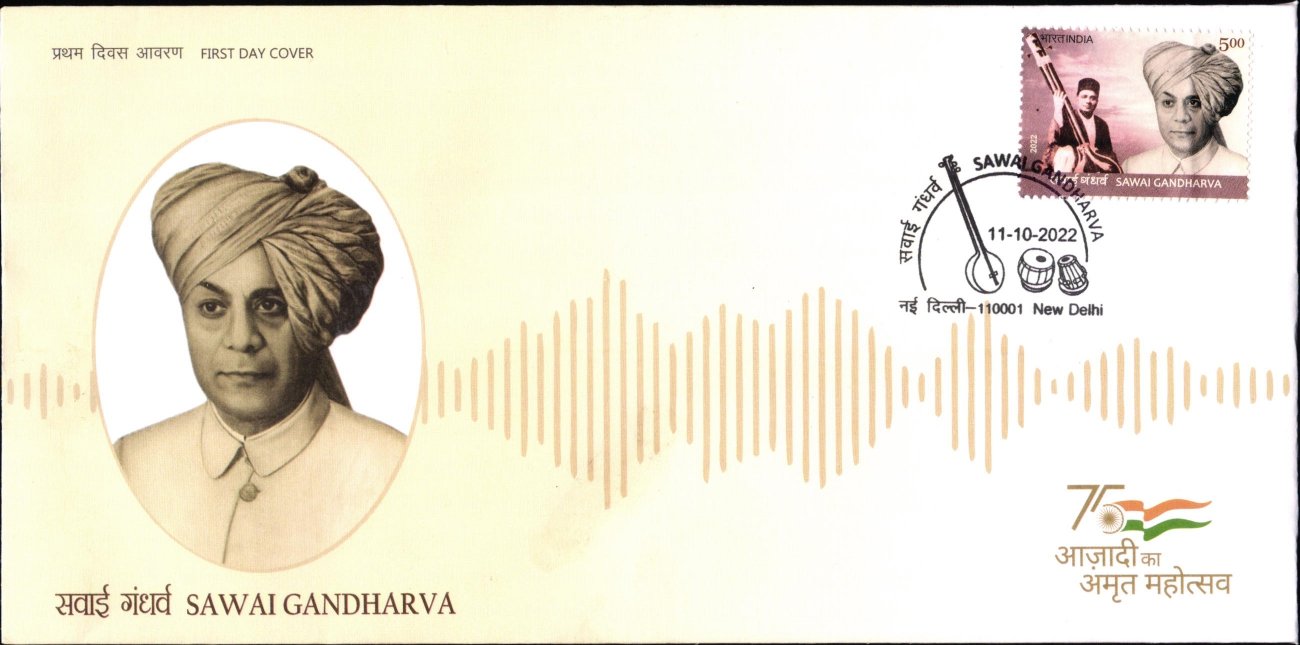Sawai Gandharva

Technical Data
| Date of Issue | October 11, 2022 |
|---|---|
| Denomination | Rs. 5 |
| Quantity | 212,350 |
| Perforation | comb 14 |
| Printer | Security Printing Press, Hyderabad |
| Printing Process | Wet Offset |
| Watermark | No Watermark |
| Colors | Multicolor |
| Credit (Designed By) | Ms. Nenu Gupta |
| Catalog Codes |
Yvert et Tellier IN 3498 Stanley Gibbons IN 3824 Michel IN 3822 |
| Themes | Commemoration | Famous people | Men | Music | Musical Instruments | Musicians | Singers |
Sawai Gandharva: Commemorative Postage Stamp Honoring a Maestro of Indian Classical Music
Pandit Rambhau Kundgolkar, lovingly remembered as Sawai Gandharva, was one of the most influential figures of Hindustani classical music and the pioneer torchbearer of the Kirana Gharana tradition. Born on January 18, 1886, in Amminbhavi, a small village in Karnataka’s Dharwad district, his early life was marked by hardship—he lost his mother at just three months of age and was lovingly raised by his maternal aunt, Smt. Tulasakka.
A Disciple of Ustad Abdul Karim Khan
At the age of ten, destiny brought young Ramachandra (later known as Sawai Gandharva) before Ustad Abdul Karim Khan, the founder of the Kirana Gharana. Recognizing his talent, the maestro accepted him as a disciple and rigorously trained him for a decade. This intensive grooming laid the foundation for Sawai Gandharva’s mastery in voice modulation, emotional depth, and precision in ragas.
Rise to Fame and Musical Legacy
After his training, Sawai Gandharva toured across India, enchanting audiences with his soulful renditions of the Kirana style. Although he briefly ventured into theatre by establishing a drama company, financial losses brought him back to his first love—music. His return to classical singing marked the beginning of an illustrious career that spanned nearly half a century.
He performed before royal courts, including those of the Maharaja of Mysore, the Nizam of Hyderabad, and the rulers of Kolhapur, Sangli, and Aundh, all of whom held him in high esteem. His concerts left an everlasting impression—whether it was Mahatma Gandhi honoring him with a khadi garland at the 1924 AICC session in Belgaum, or Governor Sir Frederic Sykes of Bombay praising his “heavenly music” in 1929 during Pune’s railway electrification ceremony.
The title “Sawai Gandharva” was bestowed upon him by Prince Dadasaheb Khaparde in recognition of his extraordinary artistry.
Guru of Great Legends
Sawai Gandharva’s legacy shines through his illustrious disciples, including Bharat Ratna Pt. Bhimsen Joshi, Padma Vibhushan Dr. Gangubai Hangal, Padma Bhushan Dr. Basavraj Rajguru, and Padma Shri Feroze Dastur. His teaching emphasized emotional depth over mere virtuosity, encouraging a patient and soulful unfolding of ragas—an approach that defined the Kirana Gharana style.
The Final Years
Despite declining health, Sawai Gandharva continued to perform with unmatched devotion. At a Ganda Bandhan ceremony in 1946, he rendered Raga Jayajayawanti and Marathi abhangs, leaving an indelible memory for his disciples and listeners. He passed away on September 12, 1951, in Pune, but his music continues to echo through generations.
Commemorative Postage Stamp
To celebrate his extraordinary contribution, India Post issued a Commemorative Postage Stamp on Sawai Gandharva, honoring his role as a cultural icon and one of the greatest voices of Indian classical music. This stamp is a tribute not only to the maestro but also to the timeless tradition of the Kirana Gharana he nurtured.
First Day Cover

